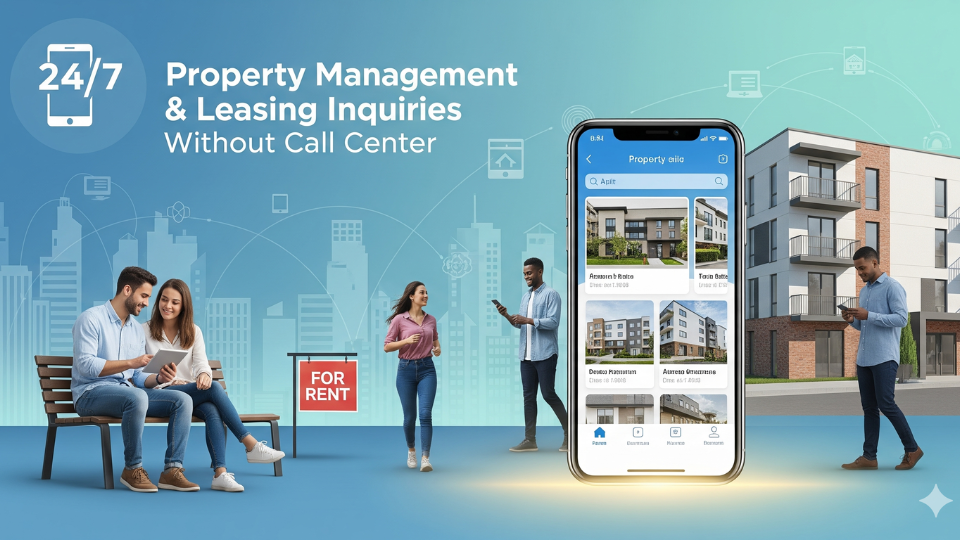Property Management: 24/7 Leasing Inquiries Without a Call Center

How fast do renters expect an answer when they inquire about a property? According to Zillow, nearly 60 percent of renters expect a response within the same day. In competitive rental markets, a slow reply can mean losing a qualified lead to another property down the street. Property managers know the challenge: calls and emails don’t stop at 5 p.m., but staffing a full-time call center is expensive and often impractical.
The good news is that modern tools allow leasing teams to handle inquiries around the clock without relying on costly call centers. With the right mix of automation and smart workflows, property managers can capture leads, provide accurate information, and schedule tours any time of day. Here’s how to deliver 24/7 responsiveness while keeping operations lean and efficient.
Capturing Leads Anytime, Anywhere
Every inquiry matters. A prospective tenant who reaches out at 10 p.m. on a Sunday is just as valuable as one who calls during office hours. Traditional models push those late-night calls to voicemail, which often go unreturned. AI-driven chat and phone systems eliminate this gap.
These systems can answer questions, collect contact details, and even book tours directly in your leasing calendar. They don’t sleep, and they don’t miss opportunities. For property managers, this means fewer lost leads and more occupied units.
One midsize property management company tested a 24/7 virtual leasing assistant and saw a 30 percent increase in scheduled tours within the first three months. Many of these tours came from after-hours inquiries that previously would have been lost.
Automating Common Questions
Prospects often ask the same handful of questions: How much is rent? Are pets allowed? Is parking available? Having staff repeat these answers dozens of times a day is inefficient. With AI-powered systems, you can automate responses to the most common leasing questions.
For example, a renter who messages about pet policies can instantly receive the correct information, complete with deposit details and breed restrictions. Another prospect might get an immediate answer about move-in specials. This not only saves staff time but also creates a consistent, professional first impression for every inquiry.
Automation also reduces errors. Human staff can sometimes give inconsistent answers, especially if policies change. A well-managed system ensures every renter gets accurate, up-to-date information. Consistency builds trust, and trust plays a major role in a renter’s decision-making process.
Scheduling Tours Without Phone Tag
Coordinating tours can turn into a back-and-forth cycle of voicemails and missed calls. Automated scheduling tools simplify this by syncing with leasing calendars. Prospects can select an available time that works for them, and the system books it instantly.
Property managers benefit in three ways:
- Faster conversions: Prospects lock in a tour while interest is high.
- Less manual work: Staff don’t need to chase down leads.
- Fewer no-shows: Automated reminders reduce the risk of empty time slots.
Consider how powerful it is when someone browsing apartments at midnight can not only ask a question but also lock in a tour for the next day. By the time the leasing office opens, the appointment is already on the calendar. This level of convenience is what modern renters expect, and property managers who deliver it stand out from competitors.
Supporting Staff Without Replacing Them
Technology is not about cutting leasing teams out of the picture. Instead, it acts as a reliable assistant that handles the repetitive work. Staff remain free to focus on higher-value interactions like showing properties, building rapport, and closing leases.
Think of it as extending office hours without hiring extra employees. When a lead requires a personal touch, the system captures the details and passes them to the leasing agent for follow-up. This blend of automation and human service creates a stronger, more efficient workflow.
Some leasing teams worry that automated systems will feel impersonal. The opposite is often true. By removing the burden of answering the same questions over and over, staff have more energy to personalize conversations and provide memorable service during tours.
Measuring and Improving Performance
One overlooked benefit of automated inquiry systems is the data they provide. Property managers can track which questions renters ask most often, what times inquiries peak, and how many leads convert into scheduled tours.
These insights help teams adjust strategies. For example, if a property receives frequent questions about utilities, managers can highlight that information more clearly in listings. If weekend inquiries surge, staff can be scheduled to handle more tours during those times.
Some platforms even measure response speed and tenant satisfaction, offering a clear view of how well the system supports leasing goals. Over time, these metrics can inform marketing campaigns, property descriptions, and staffing decisions. The result is a more responsive and data-driven approach to property management.
Building Trust Through Consistent Communication
Beyond efficiency, consistent communication builds trust with renters. A prospect who gets a prompt, professional answer at 11 p.m. feels valued. They’re more likely to believe that the property manager will be responsive once they become a tenant.
Trust is the foundation of long-term occupancy. By showing reliability from the first interaction, property managers increase the chances of converting inquiries into leases and leases into renewals. Automation helps deliver that consistency without overwhelming staff or inflating budgets.
Leasing success depends on speed, clarity, and availability. Today’s renters expect instant answers, even outside of office hours. By adopting systems that capture leads, answer questions, and schedule tours automatically, property managers can provide 24/7 service without investing in costly call centers.
The payoff is clear: more inquiries converted, fewer missed opportunities, and teams that can focus on building strong relationships instead of fielding repetitive calls. The next time a prospect reaches out at midnight, your system can handle it. By the time your staff arrives in the morning, they’ll already have new tours booked and qualified leads ready to follow up.

































































